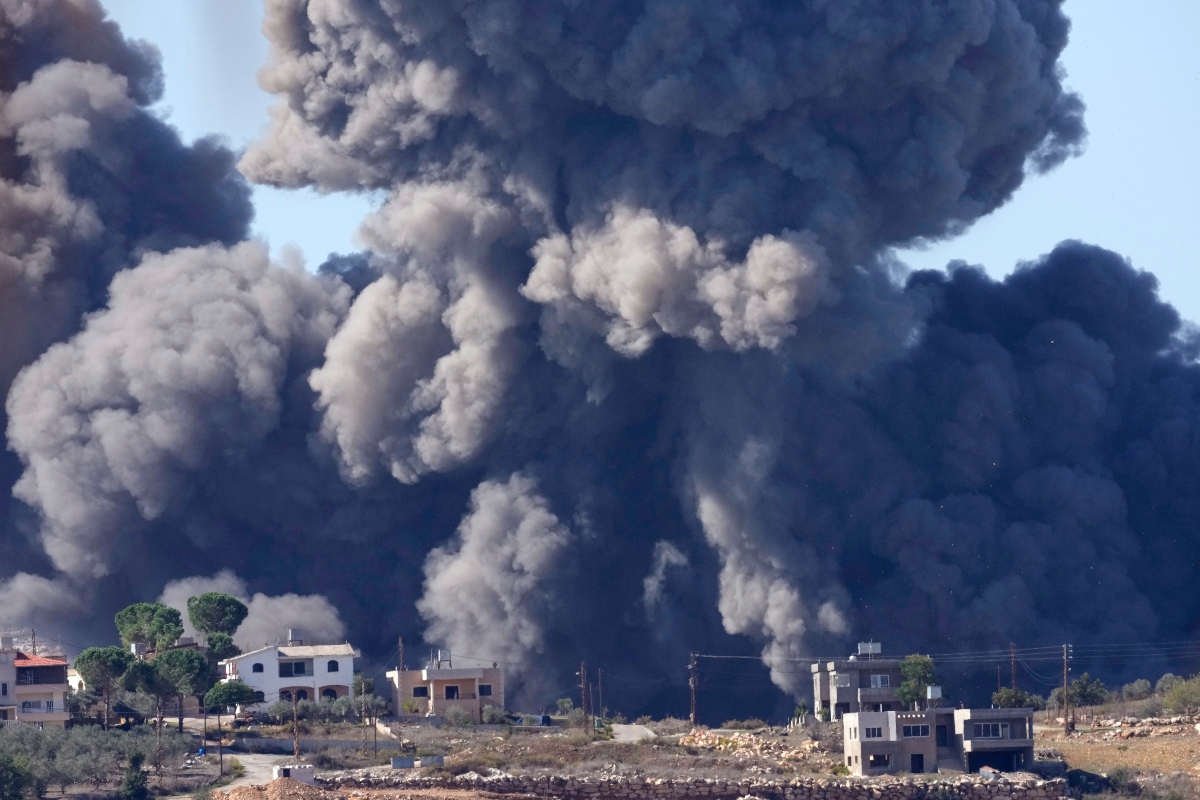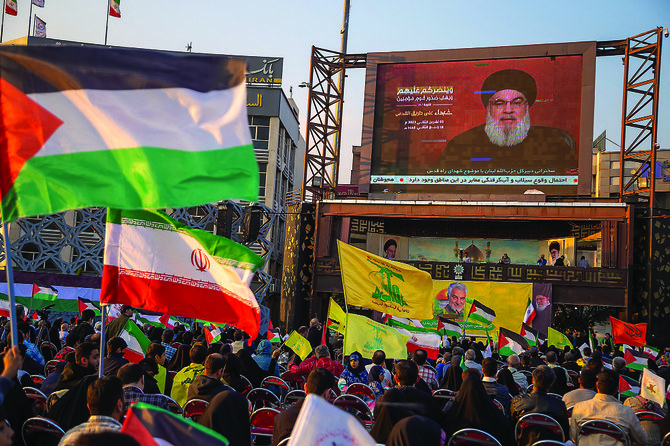DUBAI: The latest spike in border violence between Lebanon’s Hezbollah and Israel has prompted concern that the war in Gaza could still ignite a broader conflict in the Middle East.
On Saturday, Israel reportedly struck an aluminum factory in southern Lebanon some 15 km from the border, while Hezbollah claimed to have shot down an Israeli Hermes 450 drone and launched five other attacks.
These recent exchanges of fire were among the heaviest since the war between Israel and Hezbollah in the summer of 2006, which left the Beirut government with a colossal reconstruction bill and entrenched the Iran-backed militia in the country’s fabric.

Black smoke rises from an Israeli airstrike on the outskirts of Aita al-Shaab, a Lebanese border village with Israel, in south Lebanon, on Nov. 4, 2023. AFP
“It’s very clear right now that Hezbollah and Iran both have a preference to avoid a larger direct confrontation with Israel,” Firas Maksad, a senior fellow at the Middle East Institute, told Arab News.
“They are instead sort of managing what can be referred to as ‘gray zone warfare,’ short of a complete ceasefire or stalemate, but also short of a full-on war.”
This is something Iran and Hezbollah, with their paramilitary allies across the region, excel in, according to Maksad.
“They have the ability to dial this up or dial it down depending on the circumstance and what the situation in Gaza is, but it is not a full-on war,” he said.
“One of the main reasons for that is that Hezbollah is the single largest investment Iran has made outside of its borders.”
That investment has seen Hezbollah attacking Israeli troops since Oct. 8, a day after Hamas attacked Israeli towns killing 1,200 people and taking another 230 Israelis and foreigners hostage, according to Israel.
Israel fought a five-week war with Hezbollah in 2006 after the group’s fighters kidnapped two Israeli soldiers during a cross-border raid.
The conflict left an estimated 1,200 Lebanese and 157 Israelis, mostly soldiers, dead; displaced 4.5 million Lebanese civilians; and caused damage to civil infrastructure in Lebanon totaling $2.8 billion.
UN Resolution 1701, which was intended to resolve the 2006 conflict, bars Israel from conducting military operations in Lebanon, but Israel has repeatedly accused Hezbollah of violating the resolution by smuggling arms into southern Lebanon.
INNUMBERS
• 90 People killed on the Lebanese side in cross-border hostilities since last month, at least 10 of them civilians.
• 9 People killed on the Israeli side, including six soldiers and three civilians, according to authorities there.
• 1,200 Number of Lebanese, mainly civilians, killed during the 2006 war with Israel.
“Hezbollah is the first line for deterrence and defense for the Iranian regime and its nuclear program if Israel decides to strike, and it is not going to waste that to try and save Hamas,” Maksad said.
While tensions along the Blue Line (policed by a UN peacekeeping force known as UNIFIL) separating Lebanon and Israel have not escalated beyond sporadic exchanges of fire, any miscalculation could potentially spark a regional conflict between Israel and Iran’s proxies.
Hassan Nasrallah, Hezbollah’s leader, has said “all options are open” but stopped short of declaring war. In Maksad’s opinion, it all indicates a clear preference from the relevant parties to avoid regional escalation.
Speaking on condition of anonymity, a Lebanese political analyst told Arab News: “The Americans, playing the role of mediator, don’t want a war, especially in a re-election year. The Gulf states are focused on economic growth and the price of oil, and so don’t want one. Neither does Iran or its proxies.”
Buttressing this impression, Amir-Abdollahian, Iran’s foreign minister, has publicly stated several times that Iran does not want the Israel-Hamas war to spread.
“Iran achieved most of its objectives, such as disrupting Israel-Saudi diplomatic normalization and shattering the myth of Israel’s invulnerability, on Oct. 7,” Ali Alfoneh, a senior fellow at Arab Gulf States Institute, told Arab News via email.
“Hezbollah’s small provocations against Israel serve the purpose of complicating the calculations of the Israel Defense Forces, but as apparent in the Lebanese militia’s low fatalities in Lebanon and Syria since Oct. 7 (only 72 according to my database), Iran has no interest in sacrificing Hezbollah for the sake of the more expendable Hamas.”
Sought after or not, fighting continues to erupt on multiple fronts. This has included the hijacking of an Israeli-linked cargo ship and its more than two dozen crew members on Nov. 19 by Yemen’s Houthis, another Iranian proxy. Per reports, the militia claimed the ship was targeted over its connection to Israel.
Furthermore, American forces in Iraq and Syria have been subjected to 61 attacks by Iranian-backed militants since Oct. 17, according to the Pentagon.

A car belonging to Qatar's Al-Jazeera media network burns after it was hit by Israeli shelling in the Alma al-Shaab border village with Israel, in south Lebanon, on Oct. 13, 2023. AFP
Keen to walk a tight line, the US has struck back just three times, but it has bolstered its regional military presence. In late October, it deployed 2,000 non-combat US troops, two aircraft carriers with around 7,500 personnel on each, two guided-missile destroyers, and nine air squadrons to the Eastern Mediterranean and Red Sea region as a deterrent force.
Some are asking how long the US can afford to keep its aircraft carrier strike forces and nuclear submarines in the Middle East to deter a regional war while at the same time supporting the war in Ukraine.
“I do not believe there is a clear time limit,” Hussein Ibish, a senior resident scholar at the Arab Gulf States in Washington, told Arab News by email. “These aircraft carrier strike groups are designed to be at sea for long periods of time. I think they can stay there for a tremendously long time.”
The consensus view of these analysts seems to be that the Biden administration’s strategy for preventing a regional war is working, at least for now.

A shell that appears to be white phosphorus from Israeli artillery explodes over a house in al-Bustan, a Lebanese border village with Israel, in south Lebanon, on Oct. 15, 2023. AFP
“American efforts at deterrence have worked,” Maksad said. “Whether it is (via) the aircraft carriers in the Mediterranean or in the Gulf or the quiet diplomacy via messages that have been sent to Iran via various interlocutors warning of the consequences that America would very much get involved if the war spreads.”
He believes all the above elements have yielded a result and are managing the fighting so that it remains short of an all-out war or confrontation.
But what would change that equation? For one, might Israel turn toward Lebanon after settling scores with Hamas?
“Lebanon has dodged a bullet — so far,” said Maksad.
But a miscalculation could see Lebanon dragged into a larger war. In 2006, neither Hezbollah nor Israel wanted a war, but they ended up fighting for 34 days. And there is also a risk on the Israeli side, which has made it clear that it would not spare Lebanon were Hezbollah to join the war.
“What we are doing in Gaza, we can do in Beirut,” Yoav Gallant, Israel’s defense minister, said on Nov. 11 in a warning to Hezbollah against escalating the violence along the border.
Gallant has reportedly shared with US Secretary of State Antony Blinken his desire to strike Hezbollah preemptively, but he has evidently been overruled by his Israeli colleagues.
If Hezbollah were to join the war, said Ibish, while Israel might be “badly hit with tens of thousands of casualties at a minimum,” Lebanon would be “utterly decimated and set back in generational terms.”
One turning point that could see Hezbollah dragged into the fighting would be Hamas’ impending destruction as a military organization.
“Hezbollah would then have a tough choice to make: whether to sit back and watch the Palestinian leg of the alliance being dismantled or try and throw in their lot in an effort to save them,” said Maksad. “I think that they wouldn’t. They would stick to the sidelines.”
Were Hezbollah to be sucked into the conflict more fully, though, the result would be devastating.
“What Hamas did on Oct. 7 is kindergarten stuff compared to what Hezbollah can do if it were to get involved more fully and it can at any time, but it doesn’t want to,” a Lebanese political analyst based in the country’s south told Arab News.
“Hezbollah’s job is to be a deterrent. Occupied Palestine wants to set a trap for Hezbollah to fall into. Hezbollah hasn’t fallen for it yet.”
Still, according to Ibish, an attack on the Al-Aqsa Mosque complex in occupied Jerusalem could see Hezbollah dragged in.

Hezbollah members inspect the wreckage of a vehicle in which civilians were killed during an Israeli strike in southern Lebanon, near the border with Israel, on Nov. 6, 2023. AFP
“That would be a different story, but if the war remains contained to Gaza, I think Hezbollah will be able to stay out of it,” he said.
“Indeed, one of the few things that all four actors who had the ability to make this a regional war — Israel, Iran, the US and Hezbollah — could agree upon from Oct. 7 is that this war must not spread to include Hezbollah or anything of the kind.
“That is the main reason why it has not spread and why it probably will not spread.”
This then leaves the actions of third parties — such as Hamas, Palestinian Islamic Jihad and other Palestinian factions — operating inside Lebanon.
“Small groups might attack Israel with rockets or some such and have a ‘lucky strike,’ going further into Israel, well beyond the tacitly agreed upon one mile in each direction radius for contained skirmishing, and killing a significant group of Israeli soldiers, for example, 25 or more,” said Ibish.
“If that (were to) happen, Israel might retaliate with a great deal of force, unsure if Hezbollah was involved or it tacitly tolerated the action and needed to be blamed. Once rockets are flying and paranoia begins to set in, it is very common for armed foes to begin to misrecognize and misread each other’s intentions and actions. It can easily degenerate into a conflict that nobody wants.”
As if predicting a storm gathering on the horizon but whose course is still uncertain, the anonymous Lebanese political analyst said: “You can visit Beirut before the end of the year. I am sure there won’t be a war before then.”



























